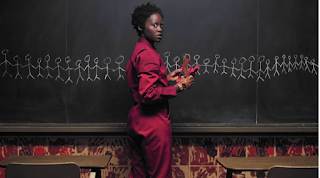Frédéric Lordon's latest book, Vivre Sans? Institutions, Police, Travail, Argent... is a conversation with Félix Boggio Éwanjé-Épée (who among other things runs the great review Période), although one in which Lordon's responses to Éwanjé-Épée's questions. Lordon uses the reflection to situate his particular Spinozist/Marxism (perhaps more adequately grasped as a kind of left Spinozism) with respect to both traditions of radical thought, Badiou, Deleuze, Agamben, and Rancière, and the current radical movements, Gilet Jaunes, ZAD, and the invisible committee. In doing so Lordon not only begins to clarify his own conception of a politics of affects and institutions, but also continues to develop a Spinozist (rather than a Marxist-Spinozist) concept of politics.
Wednesday, December 11, 2019
Saturday, November 30, 2019
We Are All Servants: On Class and Subjectivity in Parasite and Knives Out
A common thread connects Parasite and Knives Out, two of the best films of the year. That thread is not just the representation of class, but more specifically the servant as kind of figure of class struggle. At first glance this is surprising, nothing seems more archaic, more out of touch with the existing labor relations than a household servant. In different and contradictory ways these films illustrate that in age of service jobs and emotional labor the servant has gone from being a remnant of feudal era to the closest one can get to a universal figure of alienation.
Saturday, November 02, 2019
Must Love Dogs: Animals and Racism in the Age of Trump
Trump is not a dog person, or, for that matter, a cat person. He is supposedly the first president in a century to not have a pet. Past presidents have had dogs, cats, horses, even alligators. While many animal lovers breathe a sigh of relief at such news it has recently taken a strange turn. After a long history of resorting to dog as his favorite phrase of contempt, he tweeted praise of a Belgian Malinois named Conan used in the raid on Abu Bakr al-Baghdadi. Even going so far as to retweet a doctored picture of him giving the medal of honor to the animal, adding that the real dog will be visiting the White House soon.
Thursday, October 24, 2019
Negative Solidarity: The Affective Economy of Austerity
An Earlier Draft of this paper was presented at the Libidinal Economies of Crisis Times Conference
Spinoza’s question of political thought, “why do the masses fight for their servitude as if it was salvation” has taken on a unanticipated economic and social relevance since the post-2008 economic recession.Displaced from its seventeenth century context, of taxes and bread, wars of glory, and despots, it is possible to see a struggle for servitude in the way in which the masses clamor for more jobs, more austerity, and more persecution of the disadvantaged in the name of fiscal discipline. The blog Splintering Bone Ashes has dubbed this particular struggle for servitude “Negative solidarity.” Negative solidarity is defined as “an aggressively enraged sense of injustice, committed to the idea that, because I must endure increasingly austere working conditions (wage freezes, loss of benefits, declining pension pot, erasure of job security and increasing precarity) then everyone else must too.”
Tuesday, October 01, 2019
We Are the Robots: Division of Labor/Divisions of Society in the Automated Society
The number of popular books on work, books aimed beyond the narrow confines of specific disciplines, outnumbers the numbers of academic books, or more to the point, the number of books in philosophy by a ratio of at least five to one. A quick browse of Amazon (more on that company later) reveals a surprising number of books on automation, uber, service economy, etc., and that is not even counting the books that are aimed less at understanding work than reinforcing its ideology, the Seven Habits of Thoroughly Intrepellated Subjects., etc. While there has been a rising number of books within the critique of work, Weeks, Fleming, etc., these books tend to be from the perspective of sociology, political theory, or even management studies rather than philosophy. (Extending the scope beyond the Anglo-American world does change things a bit, in France at least Philosophy of Work is more than an oxymoron).
Sunday, September 01, 2019
Modes of Materialism: Spinoza and Marx (Again)
Spinoza and Bento
The different Marxist approaches to Spinoza can be viewed through the different aspects of Spinoza's thought they take up, often corresponding to different parts of the Ethics. For Althusser it is epistemology (and Part Two as well as the Appendix to Part One), for Negri it is ontology (roughly Parts Three and Four), and for Lordon it is Anthropology (and Part Three). Of course things do not always score so neatly, there are also those thinkers that traverse ontology, epistemology, and anthropology, an approach that is fitting for philosophers not animated by such scholastic distinctions. However, all of this is to introduce André Tosel's Du Materialisme de Spinoza.
Tuesday, August 20, 2019
What I am Working On: Two Quotes on Marx and Work
This post is more on the spirit than the letter of Tronti but I thought that I would use
the image of this french translation now that it has been rendered obsolete by the English translation
In general it is bad form, not to mention questionable scholarship, to treat Marx like some kind of scripture, quoting specific passages rather than looking for the overall logic or idea. Despite this injunction I often find myself obsessed with a particular passage from Marx (hell, I wrote an entire book that is a commentary on one passage from the Grundrisse). In my defense this is because, as many readers of Marx will recognized, Marx's mature thought, from Capital onward, often crystalizes in incredibly provocative and polemical passages that stand as mountains above the arid plateaus where linen is exchange for coats. Speaking of arid plateaus the first passage that I have been obsessed with comes from Volume Three where Marx writes.
Friday, August 02, 2019
Alternate Ending: On Once Upon a Time...In Hollywood
Susan Willis argues that post 9/11 America is haunted by its own contingency. The instillation of Bush into power via the Supreme Court gave is presidency an air of the unreal. The possibility of another timeline, that of the Gore presidency hung over everything like a shadow. This sense of contingency was doubled by 9/11 which despite its trauma always seemed like something that might not have happened. If this contingency was not enough there was The West Wing on television, a liberal fantasy of a different America. Different timelines become less an abstract possibility and more of a virtual reality.
Sunday, July 21, 2019
What Deleuze and Guattari Get Wrong (About Capitalism).
As I have said elsewhere, I consider the theory of capitalism put forward in Capitalism and Schizophrenia (especially Anti-Oedipus) to be a response of sorts to the definition of capital as ceaseless modernization that Marx places at the center of The Communist Manifesto.
Wednesday, July 03, 2019
Interpellated Strategically: on Jean-Jacques Lecercle's De l'interpellation and Isabelle Garo's Communisme et Stratégie
The concept of Interpellation is perhaps one of the few concepts of Althusser's to make it outside the orbit of his circle to become a general theoretical concept. It remember one year in which it seemed everywhere, showing up in books by Judith Butler and Donna Haraway. This has very uneven effects, people who are more thoroughly engaged with Althusser will point out that concept comes from a fragmentary essay, identified as "Notes towards an investigation"itself part of a draft manuscript. Its best insights are derived from either Spinoza or Lacan (depending on who you ask).
Wednesday, June 19, 2019
Doppelgängerland: The New Monster is Us
Monster come in cycles. Werewolves wax and wane in and out of cultural visibility, and even vampires disappear and return. There might even be an end to zombie movies someday. Perhaps the current period will be known as the year of the doppelgänger. I am referring not only to Jordan Peele's brilliant Us, but also the return of the mirror universe in Star Trek: Discovery and Counterpart on Starz. If one wanted to add a literary reference one could include Ted Chiang's story "Anxiety is the Dizziness of Freedom." (I know that there might be more stories and novels, I just reading Exhalation now and cannot resist plugging it).
Thursday, June 13, 2019
Unwritten: On Richard Seymour's The Twittering Machine
Academia functions by specialization. We are all divided into our respective fields, philosophy, sociology, economics, political science, etc., and then once more into the subfields, methodologies, etc. Keeping on top of the relevant material keeps us in our little cells. Publish or perish to the extent that it still remains the law of the land has as its corollary survive by specialization. Academics are like exotic tropical fauna that survive only within a particular niche.
Thursday, May 16, 2019
Breaking the Curse: On Three Recent Attempts to Theorize Neoliberalism
Moose and Lon Chaney Jr. on the set of The Wolfman
I could justify this by the way I have written about werewolves and capital, but the truth is that I just like it
To begin with something of a dialectic. The strength of neoliberalism as a concept is how expansive it is; it offers not just an account of capitalism, of economic relations, but culture, politics, and even subjectivity. The weakness of neoliberalism as a concept is how expansive it is, making it possible to call everything and anything from Uber to yoga neoliberal. It proposes a night when all cows are black, or, more to the point, when all cows are entrepreneurs of their direct farm to market line of organic milk products, as competition and entrepreneurial relations are everywhere. However, to borrow a line from Marx, this excess and limitation does not go from text books into reality, but from reality to textbooks. The instability and expansiveness of the concept might just have something to do the reality of the thing.
Sunday, April 28, 2019
Memories of a Ratman: Becoming Animal in Film, Literature, and Philosophy
Film has a strange status in Deleuze and Guattari's Capitalism and Schizophrenia. There is nothing like a theory of film in the two volumes; as much as the politics and economics of representation through regimes of signs, synthesis of recording, and assemblages of expression are theorized film is barely mentioned. The two volumes have more to say about television as medium than cinema, which will of course later be part of a two volume study by Deleuze. This is not to say that it is entirely absent, and when film does appear it is not as specific medium to be considered on its own but as an illustration of concepts and problems. Which is not to say that film is marginal these illustrations engage the central conceptual problems in each book. In Anti-Oedipus Nicholas Ray's Bigger than Life illustrates the socio-historical nature of desire beyond family confines, and in A Thousand Plateaus the film Willard illustrates the concept of becoming animal.
Monday, April 15, 2019
Becoming Spider-Man: Deleuze and the Superhero Film
In the end of Cinema, Volume One: The Movement Image writes the following about the demise of the movement image:
Certainly people continue to make [movement image] films: the greatest commercial successes always take that route, but the soul of cinema no longer does. The soul of the cinema demands increasing thought even if thought begins by undoing the systems of actions, perceptions, and affections on which the cinema had fed up to that point. We hardly believe any longer that a global situation can give rise to an action which is capable of modifying it—no more than we believe that an action can force a situation to disclose itself, even partially.
It seems to me that Deleuze's picture of the movement image lingering on might be one way to make sense of the superhero film.
Saturday, March 23, 2019
You Will Not Replace Us: On Jordan Peele's Latest
Us is a strange title for a horror film. "Them" and "It" are often the go to pronouns for horror, suggesting otherness and the unknown. In contrast to this "us" is often seen as the familiar, that which is generally threatened by some unknown "it" or "them." "Us" suggests unity not division, familiarity rather than fear, and would in general seem a more fitting title for a sappy romance than a horror movie. That Jordan Peele uses this title for his film suggests how uncanny it is, and how much the divisions between us and them are going to come under scrutiny. Jordan Peele's first film, Get Out hinged on the terror of the realization that one could be betrayed by one's most intimate relationships. While Us works with very different subtexts and cultural anxieties it takes that basic uncanny sense of the foreignness and hostility of what is most familiar to new and more twisted levels.
Saturday, March 16, 2019
The Devil is in the Details: Twilight Zone's Demonology of Capital
It is impossible to overstate how much a fan I was of The Twilight Zone. I watched every episode of the old show, it was the reason that I had a small black and white TV in my bedroom growing up; subscribed to the magazine, a magazine which covered science fiction and published original short stories; and watched the movie and reboot.
Monday, March 04, 2019
Boiling Frogbooks: Education's Past and Future
Portrait of the author as a Hampshire Student
I graduated from Hampshire College. Not only that, but I credit Hampshire for much of my early education. It is for this reason that I have followed the news about its current troubles very closely. Hampshire's troubles, and the possibility that the college could close, feel not just like the future being cancelled but the present as well. It is like watching one's very own condition of possibility disappear. I felt the same way about the elimination of the Philosophy, Interpretation, and Culture program at Binghamton University. It is like that scene in Looper where the character in the future is literally dissected by the past.
Sunday, February 03, 2019
Class Monsters, Or Monsters of Class: Simone Weil's Contribution to a Bestiary of the Present
Simone Weil's "Sketch of Contemporary Social Life" is a text that seems oddly prescient at every turn, making Weil appear to be a seer as much as the saint she is often made out to be. There are references to what later generations would call "the culture industry," "financialization," and even the theories of the imaginary that dominant contemporary politics.
Sunday, January 27, 2019
Working Alone in America: On Lodge 49
The rise of "prestige television" could also be told as a story of the decline of the American dream. From Tony Soprano's nagging suspicion that "The best is over" to Frank Sobotka's assertion on The Wire that "We used to make shit in this country, build shit. Now we just put our hand in the next guy's pocket," so called prestige TV has been as much about the growing awareness of industrial decline as it has been sustained by complex narratives and characterization. Like a kind of Borgesian fable, American television has improved as the thing that it was about, daily life of the middle class, has unraveled. When nuclear families do appear they are just as likely to be fronts for Soviet spies or held together by lies and brutality. No show has taken this decline more literally than Lodge 49. At one point a character even utters the line "post-industrial capitalism."
Thursday, January 03, 2019
Welcome to Bizarro World: Part One
Lately, I have been thinking of Bizarro World. This is odd since I never really read many Superman comics growing up. I was mostly into Marvel comics. What I know of Bizarro world comes mainly from watching cartoons and the general cultural osmosis, despite being an obscure comic book character Bizarro even made it onto Seinfeld. What has provoked me into thinking about it is not the cultural history of the term, but its contemporary relevance. We seem to be living in an inverted world of sorts: capitalists call themselves workers, white supremacists claim to be an oppressed minority, and so on. Everything seems upside down and backwards.
Subscribe to:
Comments (Atom)



















